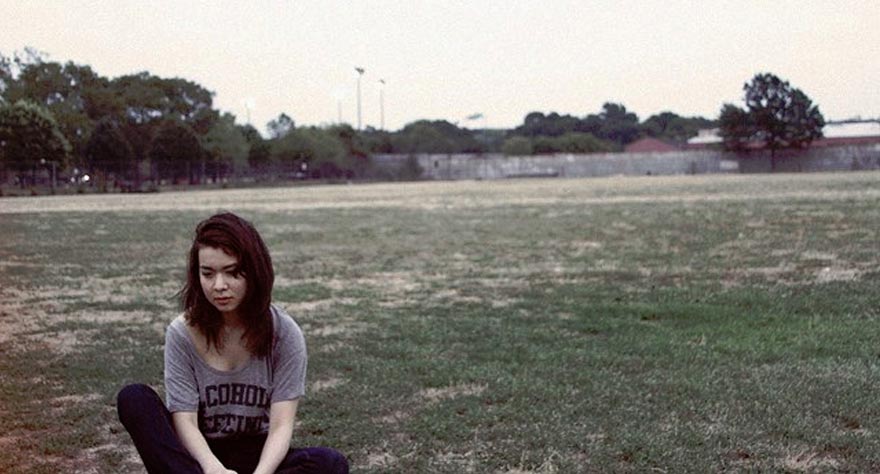
The first instance of Mitski sounding truly like herself, being what only she wants to be.

The first instance of Mitski sounding truly like herself, being what only she wants to be.
Mitski just found herself. “I’m not gonna be what my daddy wants me to be,” she chants on the harrowing, overblown chorus of “Townie”, the second single from her third and best album to date, Bury Me at Make Out Creek. It’s exactly the kind of phrase that might accompany the self-realizations that bolster the album; in fact, Make Out Creek is the first instance of Mitski sounding truly like herself, being what only she wants to be. The ghostly, precious chamber pop of her first two albums is here traded for an equally haunting, but far noisier and visceral sound. Although a few similar artists come to mind, the album is distinctly Mitski, and in discovering herself, she’s quite possibly discovered only herself: this mammoth of a collection is a treatise in loneliness, heartbreak, and the woes of solitude.
“I’ve been anywhere and it’s not what I want/I want to be still with you,” echo some of Bury Me at Make Out Creek‘s very first lines. These lovelorn sentiments, taken from opening track “Texas Reznikoff,” are as fractured and emotionally devastating as the song itself: a broken, ominous, muted folk introduction segues into a stomping, raucous, overwhelming garage pounder. The chilly image of “you’re the breeze in my Austin nights” previews next track “Townie” nicely, as do the noise and volume underlying these words. Later songs continue in this trend, with “First Love // Late Spring” gradually blooming from a barren sigh into a blazing, organ-filled coda. “One word from you, and I would jump off of this ledge I’m on, baby,” Mitski sings stolidly, emphasizing her conviction to end her loneliness.
Even the arrangements and sounds of Bury Me at Make Out Creek feel like dreary, open, depressing spaces. The guttural guitar roar of these songs often
has little to no other backing, and this sparseness is a deeply affecting, masterfully precise match for the album’s themes. The lone distorted guitar that begins “I Don’t Smoke” is only joined by at most another guitar, a distant, reverb-heavy percussion set, and Mitski’s evocative vocals; “I Will” finds Mitski’s voice at its most PJ Harvey-like against just faint keys, slinky bass, and cacophonous muted drumming. “Francis Forever” also deals in relatively minimal terrain, but uses this lack of layers to achieve a bit more noise. In whatever final form these scant sounds take, they’re deeply moving, and each pose provides deep insight into Mitski’s emotional plight.

Despite how well-crafted and successful the more sparing songs are, Bury Me at Make Out Creek‘s most memorable tracks tend to possess louder, more maximalist instrumentation. Such moments often follow quieter sections similar to those forming the entirety of other songs, making their presence a surprise that ensures the greatest possible impact. “Carry Me Out” is a great example: its initial disarming folk stance blossoms into a wailing, searing wall of guitars and demonically layered vocal chanting. “Texas Reznikoff” also opens the album with this strategy, trapping any listeners who might’ve considered ditching the album. But the song that will truly get the most attention for applying this formula is the downright scary, truly impeccable seventh track “Drunk Walk Home.” What starts as a small spattering of basic drums and an incredibly powerful vocal performance evolves into a more brazen percussive shuffle and dual-guitar unease. This tiny step up eventually explodes into a barrage of cutting, heavy guitar slamming and horror film screaming that feels like it’s trying to return to life from the grave. Easily Make Out Creek‘s standout track, it’s like Mitski’s “Hannah Hunt”: a third-album song whose moderate progression in volume and tension eventually reaches its bubbling point, resulting in a payoff that redeems itself time after time, it feels like the greatest gift the artist may ever offer.
Not to fret, though: if anything, Mitski’s latest full-length forecasts an incredibly rewarding career ahead. When a musician reinvents their sound this successfully, but with a respectable amount of sonic discrepancies among songs, it tends to be the next step in an even more cohesive, gripping direction. As menacing in its most booming moments as it is unsettling in its more subdued states, Bury Me at Make Out Creek shows Mitski solidifying her unique sound while maintaining a bit of stylistic flexibility. That someone this musically confident can be so lonely might initially be shocking, but then again, her music now stands in a class of its own. Who needs other people when you can spend time with music this good?